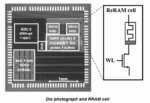Coby Hanoch is the CEO of Weebit Nano. Coby has nearly 45 years’ of experience in the semiconductor and related industries, including engineering, engineering management, sales, and executive roles. Coby was previously CEO at PacketLight Networks, and held VP Worldwide Sales roles at both Verisity and Jasper Design Automation.… Read More
Tag: Weebit Nano
Weebit Nano Reports on 2025 Targets
In early January 2026, Weebit Nano Ltd. (ASX: WBT) released a comprehensive report detailing its performance against the 2025 commercial and technical targets the company had set at its 2024 Annual General Meeting. The announcement highlighted significant progress in both business development and technology qualification,… Read More
Weebit Nano Moves into the Mainstream with Customer Adoption
Disruptive technology typically follows a path of research, development, early deployment and finally commercial adoption. Each of these phases are difficult and demanding in different ways. No matter how you measure it, getting to the finish line is a significant milestone for any company. Weebit Nano is disrupting the way… Read More
Relaxation-Aware Programming in ReRAM: Evaluating and Optimizing Write Termination
Resistive RAM (ReRAM or RRAM) is the strongest candidate for next-generation non-volatile memory (NVM), combining fast switching speeds with low power consumption. New techniques for managing a memory phenomenon called ‘relaxation’ are making ReRAM more predictable — and easier to specify for real-world applications.… Read More
Podcast EP267: The Broad Impact Weebit Nano’s ReRAM is having with Coby Hanoch
Dan is joined by Coby Hanoch, Coby joined Weebit Nano as CEO in 2017. He has 15 years of experience in engineering and engineering management roles, and 28 years of experience in sales management and executive roles.
Coby describes the impact Weebit Nano’s ReRAM technology is having for: Embedded non-volatile memory, in… Read More
Weebit Nano at the 2024 Design Automation Conference
Innovative Memory Architectures for AI – Don’t Miss this DAC Session!
We all know that the proliferation of AI applications is happening at an unprecedented rate while at the same time, memories aren’t scaling along with logic. This is one of many reasons that the industry is exploring new memory technologies and architectures.… Read More
Weebit Nano Brings ReRAM Benefits to the Automotive Market
Non-volatile memory (NVM) is a critical building block for most electronic systems. The most popular NVM technology has traditionally been flash. As a discrete part, the technology can be delivered in various form factors. For embedded applications flash presents scaling challenges, however. A new NVM technology developed… Read More
2024 Outlook with Coby Hanoch of Weebit Nano
Weebit Nano is an Israeli semiconductor company that specializes in the development and commercialization of silicon oxide-based ReRAM (Resistive Random Access Memory) technology. ReRAM is a type of non-volatile memory that holds great promise for future computing and storage applications due to its potential for high density,… Read More
ReRAM Integration in BCD Process Revolutionizes Power Management Semiconductor Design
Weebit Nano, a leading developer of advanced memory technologies, recently announced a significant collaboration with DB HiTek, one of the top ten foundries of the world. The collaboration is designed to enable integration of Weebit’s Resistive Random-Access Memory (ReRAM) into DB HiTek’s 130nm Bipolar-CMOS-DMOS… Read More
A preview of Weebit Nano at DAC – with commentary from ChatGPT
Weebit Nano, a provider of advanced non-volatile memory (NVM) IP, will be exhibiting at the Design Automation Conference (DAC) this month. As part of this briefing I shared some of the basic the details with ChatGPT to see how it would phrase things. Here is some of what it suggested: “You won’t want to miss out on the epic experience… Read More









